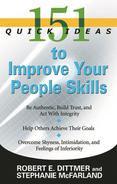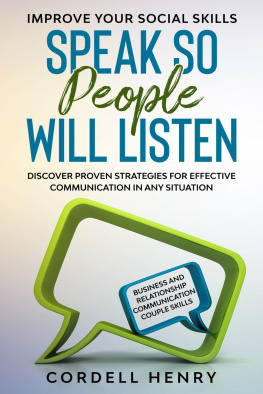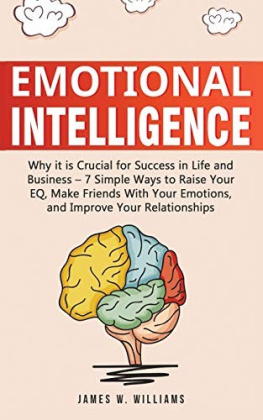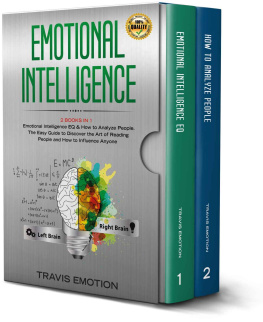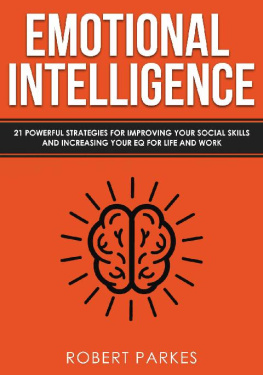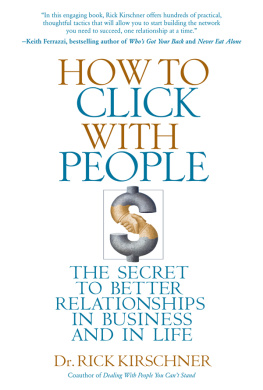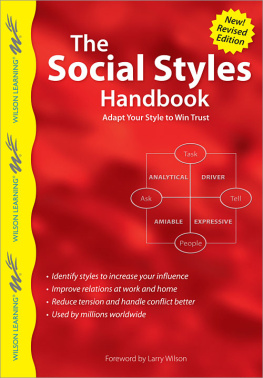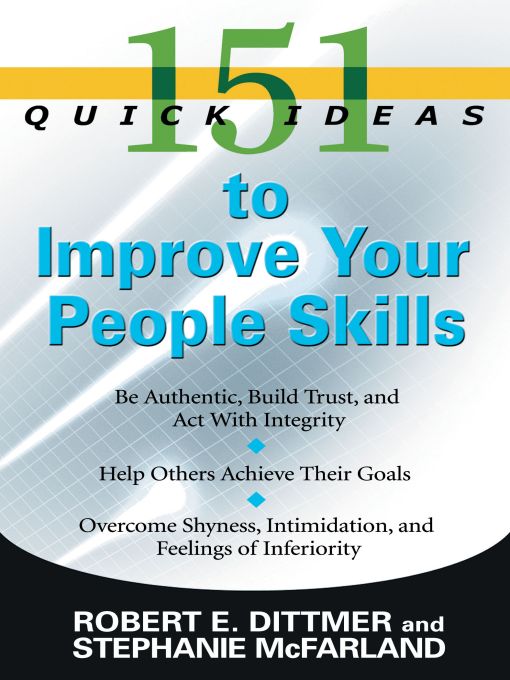
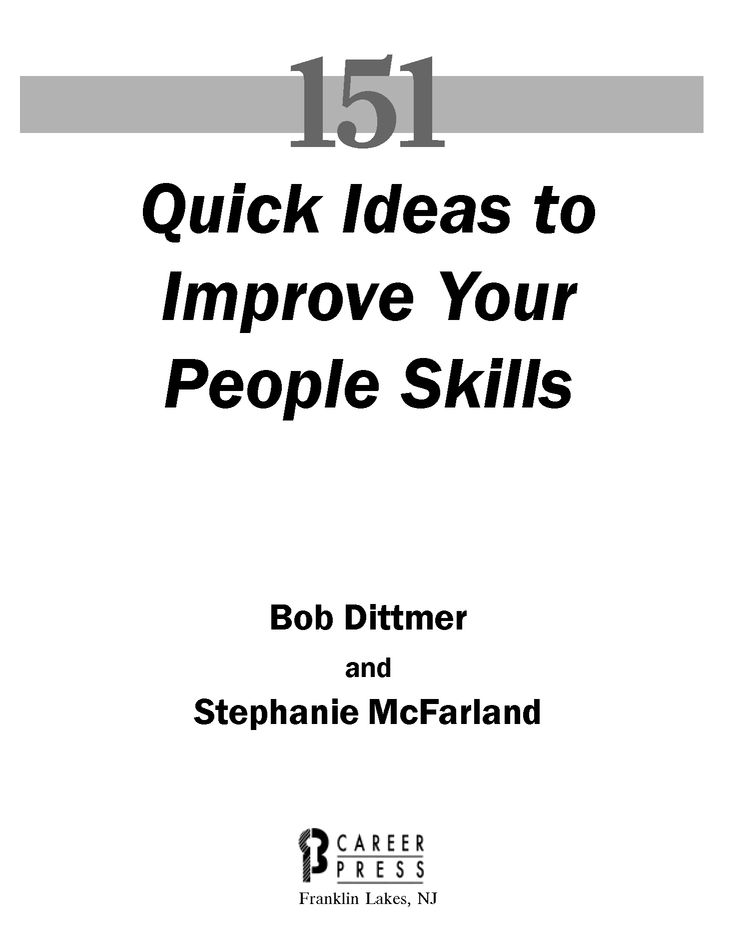
Copyright 2009 by Robert E. Dittmer and Stephanie McFarland
All rights reserved under the Pan-American and International Copyright Conventions. This book may not be reproduced, in whole or in part, in any form or by any means electronic or mechanical, including photocopying, recording, or by any information storage and retrieval system now known or hereafter invented, without written permission from the publisher, The Career Press.
151 QUICK IDEAS TO IMPROVE YOUR PEOPLE SKILLS
EDITED BY KARA REYNOLDS
TYPESET BY MICHAEL FITZGIBBON
Cover design by Jeff Piasky
Printed in the U.S.A. by Book-mart Press
To order this title, please call toll-free 1-800-CAREER-1 (NJ and Canada: 201-848-0310) to order using VISA or MasterCard, or for further information on books from Career Press.
The Career Press, Inc., 3 Tice Road, PO Box 687,
Franklin Lakes, NJ 07417
www.careerpress.com
Library of Congress Cataloging-in-Publication Data
Dittmer, Robert E., 1950
151 quick ideas to improve your people skills / by Robert E. Dittmer
and Stephanie McFarland.
p. cm.
Includes index.
ISBN 978-1-60163-037-7
eISBN : 97-8-160-16391-6
1. Interpersonal communication. 2. Interpersonal relations. I. McFarland, Stephanie, 1968- II. Title. III. Title: One hundred fifty-one quick ideas to improve your people skills.
BF637.C45D583 2009
158.26--dc22
2008035812
How to Use This Book
Every quick idea in this book is tested and true. The ideas come from the collected experiences and wisdom of hundreds of peoplewell beyond just the authors. And they are presented here to help you learn how to better create lasting relationships with others through improving your people skills.
The book is designed to be consumed piecemealthat is, in small bites. So dont try all of these ideas at once. Read the book quickly through to gain a quick impression of the ideas here, and then start picking out those that seem to be immediately helpful, and try them out. Some of these ideas are in sequence, and those will make logical sense to you when you read them. Later, routinely go back and review the others, and pick a few more to try. And so on....
Every 90 days or so, revisit this book for some new ideas or techniques. As your situation changes you may well find usable ideas that you discounted earlier.
Remember, all of these ideas and concepts are proven techniquesproven by research and other professionals around the country and around the world. They have worked for others, and they can work for you!
Introduction
Have you ever found yourself saying, Work would be great if it werent for the darn people? Yeah, weve all felt that way from time to timeand, often, more times than we would like. But people are a fact of life, and they are a fact of work. And to be effective in both, you have to learn to deal with themeffectively.
And thats where this book comes in. It is your comprehensive source for building better workingand personalrelationships. Whether you just need to tweak your approach for making connections with people in the workplace, or youre looking for ways to handle an ongoing conflict with a coworker, 151 Quick Ideas to Improve Your People Skills can help.
The tips and insights shared in this book cover four key areas of people skills: understanding why your social intelligence is critical to your career success, understanding your own interaction style (and how it affects others), how to build goodwill and emotional equity with people, and how to manage conflictand thrive through it!
For example, youve probably been taught the Golden Rule, but are you familiar with the Platinum Rule? Do you know how powerful the Pygmalion Effect can be in working with people? Do you approach people as creatures of logic, or emotion? Do you know how to set boundaries? Do you have reasonable expectations of yourself when dealing with others?
151 Quick Ideas to Improve Your People Skills covers these topics, and much, much more. It gives you a full-spectrum approach to dealing with people in just about every situationand how to get back on track when you fall off the people skills wagon.
In short, this book is an excellent guide, filled with fun, relevant, and practical ideas to which you can relate. So dig in and enjoy! And start learning what it takes to build better workingand personalrelationships.
Why Interpersonal Skills Are So Important
A full litany of proverbs exist across continents and cultures that tell us that our interactions with people mean more than anything else we do in this life. In fact, author Daniel Goleman says that our emotional intelligence (EQ) with people is more important than our IQ.
Assignment
Before you read on, consider the people with whom you interact on a daily or weekly basis, both personally and professionally. What is your relationship with them? Have you carefully cultivated and nurtured those relationships? Do you feel good about those relationships?
For example, youve probably heard this one: People dont know how much you know, until they know how much you care. And as the great Dale Carnegie once said: People are not creatures of logic. They are creatures of emotion.
Our interactions with people are the signatures of our lives, and that includes our careers, of coursemost particularly our work relationships, considering we spend a minimum of eight hours of every day on the job. For us to be effective in our jobs, we have to deal with people, and we have to deal with them effectively to be successful in our work. Its one big circular package.
The reward from good working relationships goes beyond the office, too. When we have good relationships at work, it affects the rest of our lives, from how much energy we have when we get home at night to the attitudes we bring home to our families.
People with solid interpersonal skills know how to build effective relationships, and they know that EQ is more important than IQ. They know its the currency that buys more reward in life than any gold coin or greenback ever produced.
Epilogue
Who you know is important, but having a network of solid relationships is even more important. To paraphrase a popular advertisement: You need people.
People Dont Care How Much You Know Until They Know How Much You Care
In developing relationships, people first need to care about you. And in order to care about you, they often need to understand that you care about them. After all, relationships need to be reciprocal to be effective.
Assignment
Think about your own experiences with others. Do you recognize people with whom you have good, solid relationships that were developed because you discovered they really cared about you? Did that lead you to reciprocate? Do you have other, weak relationships in which you dont sense that the other person really cares?
We see this daily with students at a university where I teach. Students walk into the classroom wanting to have an academic, learning relationship with the professor, but are often not sure whether the professor really cares about them or is just there to get the lecture in and go back to researching. The good professors find ways to communicate to students early on that they truly care about the students successes.

